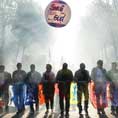




 Revolutionary Marxists outside Cuba have several fundamental tasks. We must defend the gains of the Cuban revolution against imperialism, particularly opposing the criminal US blockade of the island. At the same time, we must defend these gains against the plans of the ruling bureaucracy itself when it tries to take further steps towards capitalism. For this, we must strengthen the only conceivable social base of a second Cuban Revolution, an independent workers’ movement on the island. »»»»
Revolutionary Marxists outside Cuba have several fundamental tasks. We must defend the gains of the Cuban revolution against imperialism, particularly opposing the criminal US blockade of the island. At the same time, we must defend these gains against the plans of the ruling bureaucracy itself when it tries to take further steps towards capitalism. For this, we must strengthen the only conceivable social base of a second Cuban Revolution, an independent workers’ movement on the island. »»»»
 read comments (0)
read comments (0)
 The PCC’s last congress was in 1997. The sixth congress, originally scheduled for 2008, has been postponed indefinitely. This is a sure sign of cracks within the bureaucracy which the top leadership is working to mend before they can show themselves at a congress. »»»»
The PCC’s last congress was in 1997. The sixth congress, originally scheduled for 2008, has been postponed indefinitely. This is a sure sign of cracks within the bureaucracy which the top leadership is working to mend before they can show themselves at a congress. »»»»

 The development of China since the early 1990s shows clearly that capitalism can be restored in a degenerate workers’ state without major changes to the political regime. It is noteworthy that the official Cuban press still refers to China as socialist, even though 2/3 of the country’s millionaires (and there are many!) are members of the Communist Party of China. More importantly, the entire economy with few exceptions is dominated by the laws of the market. China’s “economic miracle” has been based on the super-exploitation of hundreds of millions of peasants herded into the cities to work as cheap labor for multinational corporations. »»»»
The development of China since the early 1990s shows clearly that capitalism can be restored in a degenerate workers’ state without major changes to the political regime. It is noteworthy that the official Cuban press still refers to China as socialist, even though 2/3 of the country’s millionaires (and there are many!) are members of the Communist Party of China. More importantly, the entire economy with few exceptions is dominated by the laws of the market. China’s “economic miracle” has been based on the super-exploitation of hundreds of millions of peasants herded into the cities to work as cheap labor for multinational corporations. »»»»

 The Cuban regime is known for its internationalism – Fidel Castro was saluted by Nelson Mandela for the contribution made by Cuban troops to the struggle against Apartheid in South Africa. Cuban doctors in Venezuela and all over the world have made important contributions to raising the standards of living in the poorest countries. »»»»
The Cuban regime is known for its internationalism – Fidel Castro was saluted by Nelson Mandela for the contribution made by Cuban troops to the struggle against Apartheid in South Africa. Cuban doctors in Venezuela and all over the world have made important contributions to raising the standards of living in the poorest countries. »»»»

 The defining feature of the Cuban economy today is the blockade imposed by the United States government in 1962 under the “Trading with the Enemies Act”, tightened again in 1996 with the “Healms-Burton Act”. Cuban sources estimate that in the last fifty years the Cuban economy has lost roughly US$86 billion due to this blockade[38]. »»»»
The defining feature of the Cuban economy today is the blockade imposed by the United States government in 1962 under the “Trading with the Enemies Act”, tightened again in 1996 with the “Healms-Burton Act”. Cuban sources estimate that in the last fifty years the Cuban economy has lost roughly US$86 billion due to this blockade[38]. »»»»

 Cuba’s joint ventures are run primarily by the Revolutionary Armed Forces (FAR). The long-time leader of the FAR and now prime minister of the island, Raúl Castro, has been considered a “reformer” since the 1980s. Military companies are now the largest partner of foreign capital in Cuba, controlling some 40% of GDP: the tourism holding company Gaviota S.A., owned by the FAR, is one of the largest companies on the island[33]. »»»»
Cuba’s joint ventures are run primarily by the Revolutionary Armed Forces (FAR). The long-time leader of the FAR and now prime minister of the island, Raúl Castro, has been considered a “reformer” since the 1980s. Military companies are now the largest partner of foreign capital in Cuba, controlling some 40% of GDP: the tourism holding company Gaviota S.A., owned by the FAR, is one of the largest companies on the island[33]. »»»»

 Cuba’s economy has seen a certain stabilization since 1999 when Venezuela began shipping cheap oil in exchange for Cuban doctors. This made it possible for the government to de-dolarize the economy, introducing the convertible peso in 2004. However, to this day, two currencies exist in Cuba: the “normal” peso paid to state workers and the convertible peso, pegged to the dollar, which is available from remittances, tourists etc. »»»»
Cuba’s economy has seen a certain stabilization since 1999 when Venezuela began shipping cheap oil in exchange for Cuban doctors. This made it possible for the government to de-dolarize the economy, introducing the convertible peso in 2004. However, to this day, two currencies exist in Cuba: the “normal” peso paid to state workers and the convertible peso, pegged to the dollar, which is available from remittances, tourists etc. »»»»

 The trade union leaderships let the pension reform pass despite the enormous resistance of the workers and youth
The trade union leaderships let the pension reform pass despite the enormous resistance of the workers and youth
For nearly two months, the French workers, together with a militant movement of secondary school students, led a massive social mobilization against the pension reform of President Nicolas Sarkozy. Eight days of mass strikes and mobilizations which brought millions of demonstrators out onto the streets; renewable strikes (for an indefinite period) in strategic sectors such as the refineries and the ports, as well as (although to a lesser extent because of the law about minimum services) the strike of the train workers; countless blockades of businesses or public places and oil depositories carried out by workers and solidarity activists; and the irruption of the secondary students and a small vanguard at the universities – all this shocked the French autumn. »»»»

 Report from the second conference of the NAL on October 30-31
Report from the second conference of the NAL on October 30-31
In the summer of 2009, the idea was born for the creation of a united radical left organization in the Czech Republic to break the isolation of the revolutionary forces. After a series of discussions, a conference in November 2009 founded the New Anticapitalist Left (NAL). On the weekend of October 30-31, 2010, after exactly one year of work, a second conference was held. But this NAL conference was attended by only a third as many people as the founding conference one year earlier. This illustrates the bad situation the NAL is in right now. »»»»

 In the mid 1980s, the Cuban leadership introduced a campaign of rectificación and recentralization of the economy. Going against the zeitgeist of Michail Gorbatchov’s Perestroika programm, this might have saved the Cuban system from complete collapse when the Council for Mutual Economic Assistance fell apart and with it a big part of Cuba’s foreign trade[20]. The response to this was the “Special Period in Times of Peace”, which began on July 26, 1990. By 1993, Cuba’s GDP had sunk by 30% – oil imports even by 70%[21]. »»»»
In the mid 1980s, the Cuban leadership introduced a campaign of rectificación and recentralization of the economy. Going against the zeitgeist of Michail Gorbatchov’s Perestroika programm, this might have saved the Cuban system from complete collapse when the Council for Mutual Economic Assistance fell apart and with it a big part of Cuba’s foreign trade[20]. The response to this was the “Special Period in Times of Peace”, which began on July 26, 1990. By 1993, Cuba’s GDP had sunk by 30% – oil imports even by 70%[21]. »»»»

 Cuba’s system fits in with Leon Trotsky’s analysis of a degenerate workers’ state: a society in which the private property of the means of production has been abolished (a precondition for the transition to socialism) but in which a privileged bureaucracy controls all political and economic institutions and suppresses all independent activity by the masses. Therefore, the transition to socialism – the withering away of the state as the working population increasingly takes over all tasks of administration – is blocked. And as a result, the whole system tends to slide back to capitalism. »»»»
Cuba’s system fits in with Leon Trotsky’s analysis of a degenerate workers’ state: a society in which the private property of the means of production has been abolished (a precondition for the transition to socialism) but in which a privileged bureaucracy controls all political and economic institutions and suppresses all independent activity by the masses. Therefore, the transition to socialism – the withering away of the state as the working population increasingly takes over all tasks of administration – is blocked. And as a result, the whole system tends to slide back to capitalism. »»»»

